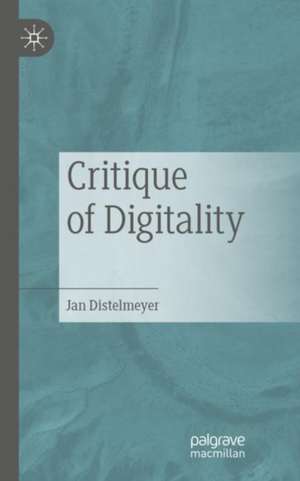Critique of Digitality
Autor Jan Distelmeyeren Limba Engleză Paperback – 13 oct 2022
How can an analysis do justice to both fundamental characteristics and changing concrete forms, infrastructures, and practices? How do the developments of a digitalization that programmatically encompasses forms of networking, embedding, and autonomization shape media, cultures, and societies? How do "artificial intelligence" and "algorithmic government" relate to each other, how does the immateriality of "the digital" fit with the materiality of computers? How does the changing status and scope of this technology mediate itself?
This book introduces ongoing debates and develops its own approach to the critique of digitality, asking about forms of interfaces and processes of governance.
This book is a translation of the original German 1st edition Kritik der Digitalität by Jan Distelmeyer, published by Springer Fachmedien Wiesbaden GmbH, part of Springer Nature in 2021. The translation was done with the help of artificial intelligence (machine translation by the service DeepL.com). A subsequent human revision was done primarily in terms of content, so that the book will read stylistically differently from a conventional translation. Springer Nature works continuously to further the development of tools for the production of books and on the related technologies to support the authors.
Preț: 226.38 lei
Nou
Puncte Express: 340
Preț estimativ în valută:
43.32€ • 45.32$ • 35.98£
43.32€ • 45.32$ • 35.98£
Carte tipărită la comandă
Livrare economică 02-16 aprilie
Preluare comenzi: 021 569.72.76
Specificații
ISBN-13: 9783658369774
ISBN-10: 3658369779
Pagini: 141
Ilustrații: VII, 141 p. 15 illus.
Dimensiuni: 127 x 203 mm
Greutate: 0.17 kg
Ediția:1st ed. 2022
Editura: Springer Fachmedien Wiesbaden
Colecția Palgrave Macmillan
Locul publicării:Wiesbaden, Germany
ISBN-10: 3658369779
Pagini: 141
Ilustrații: VII, 141 p. 15 illus.
Dimensiuni: 127 x 203 mm
Greutate: 0.17 kg
Ediția:1st ed. 2022
Editura: Springer Fachmedien Wiesbaden
Colecția Palgrave Macmillan
Locul publicării:Wiesbaden, Germany
Cuprins
Digitality and Criticism.- Interface and Conduct.- Program and Everyday Life.
Notă biografică
Prof. Dr. Jan Distelmeyer teaches media history and theory in the cooperative study program European Media Studies at the Potsdam University of Applied Sciences and the University of Potsdam.
Textul de pe ultima copertă
Dealing with digitality is one of the most urgent challenges of the present. The increasing importance and spread of computer technology not only challenges societies and individuals - this development also puts pressure on the concept of digitality, which tries to grasp the totality and peculiarity of the conditions and consequences of electronic digital computing (in all its forms). However, precisely because digitality is commonplace, so should be its critique, its analysis and assessment.How can an analysis do justice to both fundamental characteristics and changing concrete forms, infrastructures, and practices? How do the developments of a digitalization that programmatically encompasses forms of networking, embedding, and autonomization shape media, cultures, and societies? How do "artificial intelligence" and "algorithmic government" relate to each other, how does the immateriality of "the digital" fit with the materiality of computers? How does the changing status and scopeof this technology mediate itself?
This volume introduces ongoing debates and develops its own approach to the critique of digitality, asking about forms of interfaces and processes of governance.
The author
Prof. Dr. Jan Distelmeyer teaches media history and theory in the cooperative program European Media Studies at the University of Applied Sciences Potsdam and the University of Potsdam.
The translation was done with the help of artificial intelligence (machine translation by the service DeepL.com).A subsequent human revision was done primarily in terms of content, so that the book will read stylistically differently from a conventional translation.
This volume introduces ongoing debates and develops its own approach to the critique of digitality, asking about forms of interfaces and processes of governance.
The author
Prof. Dr. Jan Distelmeyer teaches media history and theory in the cooperative program European Media Studies at the University of Applied Sciences Potsdam and the University of Potsdam.
The translation was done with the help of artificial intelligence (machine translation by the service DeepL.com).A subsequent human revision was done primarily in terms of content, so that the book will read stylistically differently from a conventional translation.
Caracteristici
Overview of fundamental questions of mediality and digitality With many concrete examples Interface analyses as a new strategy in media studies
